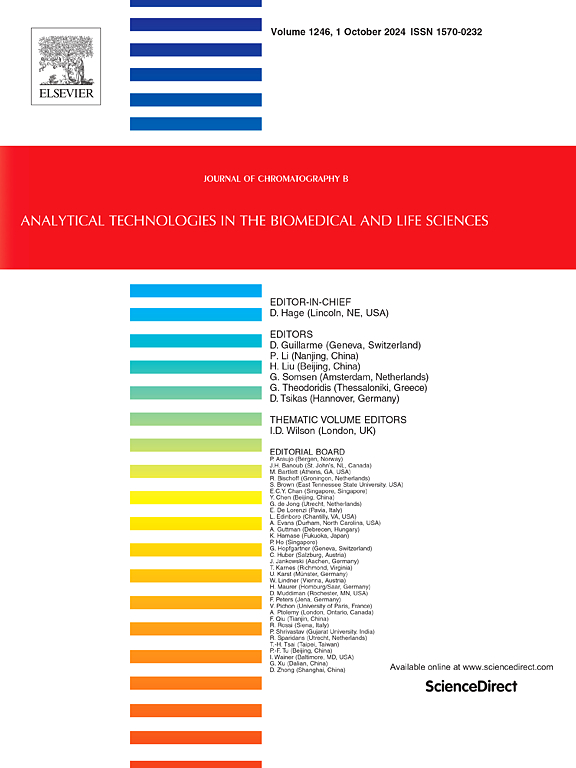网络药理学和非靶向代谢组学揭示补肾开旋通络方治疗糖尿病肾病的机制
IF 2.8
3区 医学
Q2 BIOCHEMICAL RESEARCH METHODS
引用次数: 0
摘要
补肾开旋通络方(BKT)是一种经临床验证的中药,对糖尿病肾病(DKD)患者有良好的肾保护作用。本研究采用网络药理学和非靶向代谢组学相结合的方法,在db/db小鼠中研究了BKT对DKD的治疗机制。网络药理学鉴定出BKT中338种生物活性成分靶向389个dkd相关基因,其关键通路包括AGE-RAGE、HIF-1、MAPK和PI3K-Akt信号通路以及自噬。BKT治疗显著改善肾功能(降低ACR),改善糖/脂代谢(降低GSP, INS, HOMA-IR, TC, FFA),减轻肾脏病理(减少肾小球硬化,小管损伤和纤维化)。非靶向代谢组学显示26种肾脏和28种尿液差异代谢物(VIP >;1、P <;0.05),在自噬、PPAR信号、亚油酸代谢(肾脏)和TCA循环/硫胺素代谢(尿液)中富集。关键代谢物如α-二态胆酸(肾)、焦磷酸硫胺素(尿)和LysoPC(18:4)与BKT的肾保护作用有关。这些研究结果表明,BKT通过多靶点调节代谢、炎症和应激反应途径缓解DKD,其协同作用被网络药理学预测,并被代谢组学证实。本研究为BKT在DKD治疗中的临床应用提供了科学依据。本文章由计算机程序翻译,如有差异,请以英文原文为准。
Network pharmacology and untargeted metabolomics reveal the mechanisms of Bushen Kaixuan Tongluo formula in diabetic kidney disease
Bushen Kaixuan Tongluo Formula (BKT), a clinically validated Traditional Chinese Medicine, has shown promising renoprotective effects in diabetic kidney disease (DKD) patients. This study investigated the therapeutic mechanisms of BKT in DKD using an integrated approach combining network pharmacology and untargeted metabolomics in db/db mice. Network pharmacology identified 338 bioactive components in BKT targeting 389 DKD-related genes, with key pathways including AGE-RAGE, HIF-1, MAPK, and PI3K-Akt signaling, as well as autophagy. BKT treatment significantly improved renal function (reduced ACR), ameliorated glucose/lipid metabolism (lowered GSP, INS, HOMA-IR, TC, FFA), and attenuated renal pathology (reduced glomerulosclerosis, tubular injury, and fibrosis). Untargeted metabolomics revealed 26 renal and 28 urinary differential metabolites (VIP > 1.0, P < 0.05), with enrichment in autophagy, PPAR signaling, linoleic acid metabolism (kidney), and TCA cycle/thiamine metabolism (urine). Key metabolites such as α-dimorphecolic acid (renal), thiamine pyrophosphate (urinary), and LysoPC (18:4) were implicated in BKT's renoprotective effects. These findings demonstrate that BKT alleviates DKD through multi-target modulation of metabolic, inflammatory, and stress-response pathways, with synergistic actions predicted by network pharmacology and validated by metabolomics. This study provides a scientific foundation for clinical application of BKT in DKD treatment.
求助全文
通过发布文献求助,成功后即可免费获取论文全文。
去求助
来源期刊

Journal of Chromatography B
医学-分析化学
CiteScore
5.60
自引率
3.30%
发文量
306
审稿时长
44 days
期刊介绍:
The Journal of Chromatography B publishes papers on developments in separation science relevant to biology and biomedical research including both fundamental advances and applications. Analytical techniques which may be considered include the various facets of chromatography, electrophoresis and related methods, affinity and immunoaffinity-based methodologies, hyphenated and other multi-dimensional techniques, and microanalytical approaches. The journal also considers articles reporting developments in sample preparation, detection techniques including mass spectrometry, and data handling and analysis.
Developments related to preparative separations for the isolation and purification of components of biological systems may be published, including chromatographic and electrophoretic methods, affinity separations, field flow fractionation and other preparative approaches.
Applications to the analysis of biological systems and samples will be considered when the analytical science contains a significant element of novelty, e.g. a new approach to the separation of a compound, novel combination of analytical techniques, or significantly improved analytical performance.
 求助内容:
求助内容: 应助结果提醒方式:
应助结果提醒方式:


